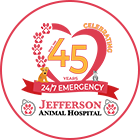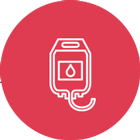by Danielle Henson
August is National Immunization Awareness Month. The goal of this month is to boost awareness of immunization for humans and pets alike! Here at Jefferson Animal Hospital, we strive to educate our clients on all of the best practices that keep their pets healthy and happy. We believe that vaccinations are a step in that direction.
Why It’s Important to Vaccinate Your Pet:
Vaccinations are designed to build your pet’s immunity so that they can fight off disease-causing agents carried by fleas, ticks, and other infected animals. Vaccines provide immunity against a wide variety of diseases that can potentially be life-threatening to your furry friends such as influenza, rabies, bordetella, parvovirus, distemper, infectious hepatitis, feline leukemia, and many others.

Here are 5 Reasons to Get Your Pet Vaccinated:
- Vaccinations prevent many diseases that can make your pet ill.
- In many states, including Kentucky and Indiana, it is required that pets be up-to-date on vaccinations in order for them to be registered.
- By preventing disease, vaccines are a cost-effective way to avoid paying the high prices of treatment that would be needed in order to save your pet from the illness that could potentially affect your pet otherwise.
- Not only do diseases and illnesses get passed between pets, but some can be passed from your pet to you! Vaccines help prevent this from happening and keep your home safe for everyone!
- If your pet lives an active, outdoor lifestyle with you, they are at risk of diseases carried by wildlife. Getting them vaccinated will keep them safe.
What to Expect After Your Pet is Vaccinated:
Much like humans, pets can have mild side effects after receiving vaccinations. Some side effects may transpire in a few hours or 1-2 days after the initial injection. These typically clear up swiftly and may include the following:
- Discomfort and localized swelling at the injection site
- Sneezing, mild coughing, and snotty nose
- Mild fever (Typically around 103-103.5 F)
- Little to no appetite and low energy
Other side effects that may occur, some as quickly as 1-2 minutes after injection, and stay present for a prolonged period of time are less common. However, if any of these symptoms arise, please contact a veterinarian and seek out treatment immediately:
- Persistent vomiting
- Diarrhea
- Hives
- Swelling of the muzzle, around the face, neck, or eyes
- Mild swelling under the skin may develop at the site of a recent injection. It should start to disappear within a couple of weeks. If not, contact your veterinarian.
- Severe coughing or difficulty breathing
- Collapse
If you have any questions regarding vaccinations for your pet, we highly recommend contacting a veterinarian for advice. Vaccines save lives every day and we hope that your four-legged friend is one of them.
🐕
Would you like to book an appointment online with us to get your pet(s) vaccinated? Visit nextvetvisit.com to select which Jefferson Animal Hospital location and time is most convenient for you!






